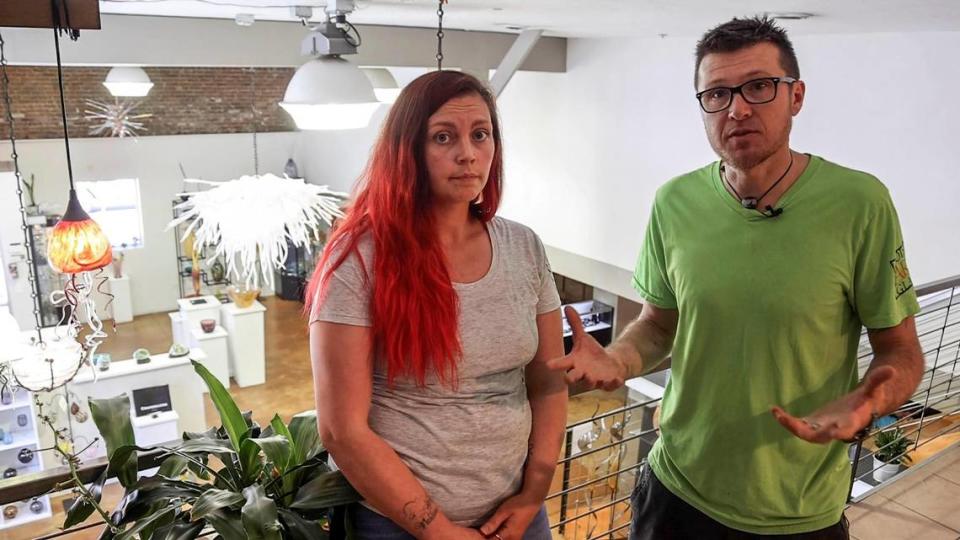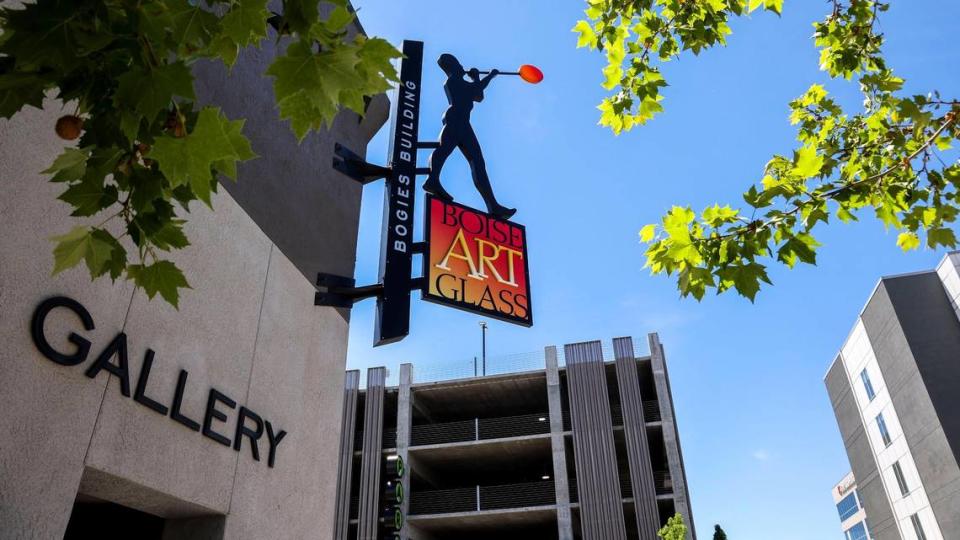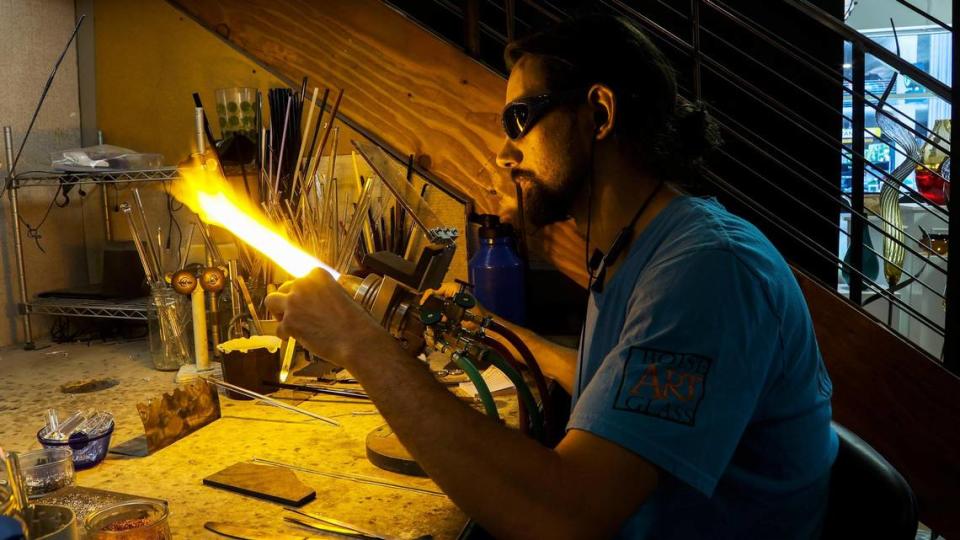Boise wants nice buildings, not cheap parking. One business says: ‘Don’t squeeze us out’
Filip Vogelpohl just wants a place for his employees to park. Somewhere his business can afford, somewhere not blocks away, and somewhere that’s not going to be developed into Boise’s newest downtown apartment or condominium building for the well-to-do.
Vogelpohl owns Boise Art Glass, on the northeast corner of 12th and Front streets. If his 11 employees are going to come downtown to work for him, he thinks he should cover their parking. But paying for parking has become increasingly challenging as development downtown pushes west and city planners aim to eliminate uncovered outdoor ground-level parking lots, also known as surface parking lots.
It’s a tug of war between the city Boise was and the city it’s becoming.
Vogelpohl is fine with losing surface lots in exchange for more parking garages and improved non-car transportation options. But the latter hasn’t happened as fast as the loss of parking lots. The city views surface parking lots as an eyesore and an inefficient use of valuable downtown land.
Vogelpohl has recently started telling employees that the company can pay only for one: their parking or their Christmas bonuses.
“(The city should) help out the small businesses to stay alive and stay here,” Vogelpohl said. “Don’t squeeze them out.”
City Planning Director Tim Keane views parking differently.
“This process of building on surface parking lots is one that the city’s in the midst of and it is a transition period,” Keane told the Idaho Statesman. “So there’ll be some uncomfortableness associated with it. But it is part of what is necessary for the city to be more successful in every way.”

Vogelpohl has owned Boise Art Glass for 15 years downtown. The business makes handmade glass items like jewelry, sculptures and chandeliers. It also offers classes for people to make their own crafts.
Boise Art Glass had been paying $680 per month for eight spots — $85 per spot — at The Car Park lot just across the street on the west side of 12th Street.
In February, The Car Park told Vogelpohl he’d no longer have access to that lot, because the Saratoga Apartments, originally planned to have 305 units, would be built on that site. The Boise Art Glass spots were reassigned to a lot between Front and Myrtle streets, west of 13th Street, where Interstate 184 begins and ends, only about a block farther from the shop.
Five weeks later, Boise Art Glass was told that come June 1, it couldn’t use that lot anymore either.
Vogelpohl and General Manager Malisa Scott weren’t happy with any of the alternatives. They could have moved to a ParkBoi garage at 11th and Front streets, two blocks away from the business, but that would cost $125 per user per month — an overall increase from $680 per month to $1,000. There was also an available lot at 15th and Idaho streets, about six blocks away.
“At that point, there’s free parking over there,” Scott said. “We can just find our own if we’re gonna have to walk that far.”
The best deal Scott could find was $100 per spot in a lot at 11th and Myrtle streets run by Republic Parking. Boise Art Glass had added an employee by then, so it would cost $900 per month. While that deal is getting worked out, Boise Art Glass is paying employees a parking stipend.
Vogelpohl’s ire lies not with the parking companies, but with the city’s leaders, who want attractive new development on surface lots. Meanwhile, driving to work downtown is the top transportation option, especially for people who can’t afford to live closer.
“It’s frustrating to see our mayor and our council make decisions for the betterment of the (newer people) that are moving here,” Vogelpohl said.

City aims to eliminate surface lots
From a land-use perspective, nothing is worse than a surface parking lot. Keane, the planning director, said it’s the “most damaging” type of land use.
Surface parking lots mean desirable destinations are farther away from each other and the area is less walkable. If walking or cycling isn’t a safe and enjoyable experience, people won’t walk or bike, Keane said.
“Convenient parking is not a thing for a city. Convenient parking is for someplace in the suburbs,” Keane said. “We can’t be a better suburb than the suburbs. I got news for you: If you’re a business in downtown Boise, good luck competing with some big surface parking lot in the suburbs. What you can win at is being a city.”
With Boise’s development boom, downtown parking is only going to get more expensive as the supply of available lots continues to shrink, said Matt Edmond, the parking and mobility director for Capital City Development Corp., Boise’s urban renewal agency.
The shift is intentional. At a December Capital City Development Corp. board meeting, Chair Dana Zuckerman said “any parking structure is better than surface lots, which is one of our goals in the agency to eradicate.”
During the same meeting, Capital City Development Corp. project manager Zach Piepmeyer reviewed plans to redesign West Fulton Street to create a more lively environment. He said property owners had mixed feelings about losing on-street parking.
In a draft of the city of Boise’s zoning code rewrite, in a section about mixed-use zoning districts, “No surface parking spaces may be located between the front façade of the building and any street adjacent to the property.”
Capital City Development Corp. owns and operates six ParkBoi garages, totaling 3,200 parking spots, which account for about 15% of the parking spaces downtown. Edmond said the agency tries to balance affordability, convenience and availability. Each garage can have only two of the three.

The garages closer to the downtown core are more expensive. The Capitol and Main garage and 9th and Main garage each charge $190 per month for a spot. The three next closest garages charge $150.
“This is growing pain,” Edmond said. “But at some point, we’ll see a new paradigm where there’s a lot less dependency on that single-occupant vehicle, people will be able to live closer to work.”
There are signs showing Keane’s futuristic vision might not be so far off. He referred to the parking garage at 5th and Front streets owned by Boise developer Clay Carley. It’s shared among people using several nearby buildings. The garage helped spur more than $100 million in private investment, including 249 residential units that may not have happened without the garage. Through an arrangement, the nearby buildings don’t need to have their own on-site parking.
Keane called that “amazing” and said it shows how Boise is in a position to shift its parking styles quickly. If accommodations are only for residential parking, though, that doesn’t account for the downtown workers commuting in from elsewhere.
As of March 2020, there were 3,477 people — or 1.5% of Boise’s population — living within the footprint of the Downtown Boise Neighborhood Association, according to the city’s neighborhood data almanac. That means most downtown workers commute into the area.
To Keane, that’s their choice. Some people like Scott, Boise Art Glass’s general manager, wouldn’t want to live downtown anyway. She has five children. A bigger home with a yard in Southwest Boise is preferable.
“If people are choosing to live in locations where they have to drive to everything, then what are we supposed to do?” Keane said. “That’s their personal decision. That doesn’t mean we have to build a gold-plated parking space for them downtown. We’re not doing that.”
To business owners like Vogelpohl, the city is catering more to the small number of people who can afford to live in new downtown apartments than to others.
The Vanguard, a recently built downtown apartment building, is renting studios for $1,425 per month. That’s on the low end. Other downtown buildings are more expensive. It’s a high cost for people working in industries that aren’t as lucrative.
“They’re so expensive and out of reach for any Idahoan,” Vogelpohl said. “And so why are they building all these buildings? They’re not for us. And in doing so, it’s damaging the existing businesses that are already here by taking away parking spaces.”
There are a lot of downtown housing developments in the works. More options would serve more people and potentially bring down prices. But unless they’re dedicated to people earning a certain income, there’s no guarantee any average-earning Boisean could afford to live there.
This pinch on downtown parking isn’t new. Businesses felt it five years ago, too, according to previous Statesman reporting. Boise has continued growing since then, cars have remained popular, and alternatives haven’t fully picked up steam. Valley Regional Transit has bus lines that run once every 30 minutes or once every hour, and new protected bicycle lanes have become controversial.
Maybe someday, those alternatives will be more viable. For now, Edmond estimates that single-occupant vehicles account for 90% of transportation downtown.

Boiseans will always have cars, developer says
Roundhouse, a Boise development company, relocated from California a few years ago. It’s been responsible for developing downtown apartment buildings like The Fowler and Hearth on Broad, among others. Some of its buildings have sprouted up from surface parking lots — the exact type of redevelopment the city is promoting.
Roundhouse Vice President of Development Patrick Boel views Boise as a one-to-one-ratio market. That means at least one parking spot for each unit. When constructing new buildings, that’s what Roundhouse considers.
“No matter what, people are always going to have cars,” Boel said by phone. “They have mountain bikes and kayaks, they have ski gear, and they want to go play on the weekends. So you really have to accommodate cars.”
At The Fowler, 505 W. Broad St., and Hearth on Broad, 406 S. Broad St., nearly every unit has a parking spot in a garage that’s built into the building. The Watercooler, 1401 W. Idaho St., has a surface parking lot that is fully occupied. So too are the garages at Roundhouse’s C.W. Moore Apartments, 450 W. Grove St., and Riverwalk, 1689 W. Shoreline Drive.
Roundhouse also owns a surface lot on the southeast corner of 5th and Broad streets that’s nearly full. It will likely be the site of a future apartment building.
In 2015, when Roundhouse built The Fowler, there weren’t any comparable projects in downtown Boise. For Roundhouse to receive financing from a lender, Capital City Development Corp. agreed to buy half the parking structure and allow the public to use it.
Ultimately, Roundhouse made the project work on its own, and the agency didn’t buy the spots. But the idea alone was profound, because of how it kickstarted the wave of new apartment buildings downtown.
“CCDC has been monumental in spurring and helping fund structured parking garages,” Boel said.

Possible parking solutions
Scott said one of the biggest problems is that employees can’t pay for street parking nearby because there are four-hour time limits. That doesn’t suffice for an eight-hour shift. Her preference is to wipe out Zone 3 of the city’s on-street parking meters. Boise Art Glass is in that zone.
Scott and Vogelpohl want discounts for small businesses. Edmond said that’s a “slippery slope,” because Capital City Development Corp. is a public agency.
Better public transit is another solution. But ridership dropped when the COVID-19 pandemic began and expanded routes are still being planned.
The parking situation makes it challenging for Boise Art Glass to compete for employees against places like Amazon or at the Village at Meridian, where parking isn’t an issue. It’s already hard enough as a small business dealing with rising inflation and property taxes, Vogelpohl said.
As explosive growth has pushed Boise and its people beyond what’s comfortable, more affordable downtown parking is another victim. To some, that’s a problem. To others it’s a necessary evil.
“Things they’ve gotten used to maybe aren’t as convenient as they used to be,” Keane said.

 Yahoo Movies
Yahoo Movies 
